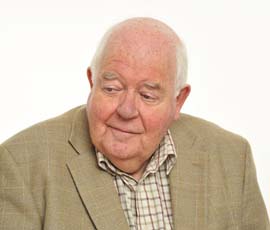Old buzzwords get new urgency for food production

I try to vary the topics discussed in these columns from week to week, but on this occasion I want to expand upon a theme I’ve followed in the last two issues.
I won’t apologise because the subject is so vitally important, not just to farmers but also to consumers across the EU and beyond. I refer, of course, to the need for Europe’s farmers to increase production and to play their part in feeding the growing world population. Just to remind you – that population is expected to rise to 7bn within the next three months, to hit 8bn around 2025 and 9bn well before 2050.
These facts and many more were presented in a report recently published by the House of Lords European Union Committee, the title of which was Innovation in EU agriculture. It might more appropriately have been entitled The lack of innovation in EU agriculture for that was its main gist.
As the chairman of the committee, Lord Carter of Coles said when presenting the report: “Europe must act quickly and coherently to transform EU agriculture and make it ready to face the challenge [of helping to feed 9billion people].” But European agriculture, he concluded, was in danger of stagnating because of the political leanings in a number of influential EU member states.
To illustrate his point, he quoted what Georg Hausler, Head of the Cabinet of the Agriculture Commission said to the committee when they had interviewed him. “We in Europe are in an innovation-hostile environment. A lot of political groups are telling us to farm as we did in the 19th century, selling our tractors and doing it the old way This is the strategic debate. Does Europe say it can provide food for 500million rich Europeans and import what we do not have, or does it play a role in feeding people in China and India who are starting to eat meat?”
At least, I suppose, here was an official who recognised the dilemma. But what was he doing about it? What could he do about it given the “innovation-hostile environment” among his political masters?
Meanwhile, according to OECD-FAO’s Agricultural Outlook, between 2010 and 2019 the projected increase in food production across the EU is put at 4%; in the USA over the same period production is expected to increase by 15% to 20%; while in Brazil the increase is forecast to be over 40%.
The starting point in each case is different and the discrepancy will not be as great as those figures suggest, as Brazil, for instance, adopts modern technology more widely. But the point is that European complacency is leaving us in a dangerous, vulnerable place, never mind not doing what we could and should for the rest of the world.
The Lords’ recommendations to the EU and the UK government were predictable but no less important for that. There must be a much greater investment in research and co-operation between the institutions conducting it to avoid repetition and promote speed of development. The application of research, what we used to call “near market”, needs urgent attention, they said, for there is a virtual vacuum where ADAS used to be. Training establishments need to raise their game and sign up to the urgent future challenge. And so on – none of which is new thinking but little of which is happening.
I just wish others in and around the corridors of power took more notice of those wise old birds on the red benches.
David Richardson farms about 400ha (1,000 acres) of arable land near Norwich in Norfolk in partnership with his wife, Lorna. His son, Rob, is farm manager.
Read more from David and the other Farmers Weekly columnists.
